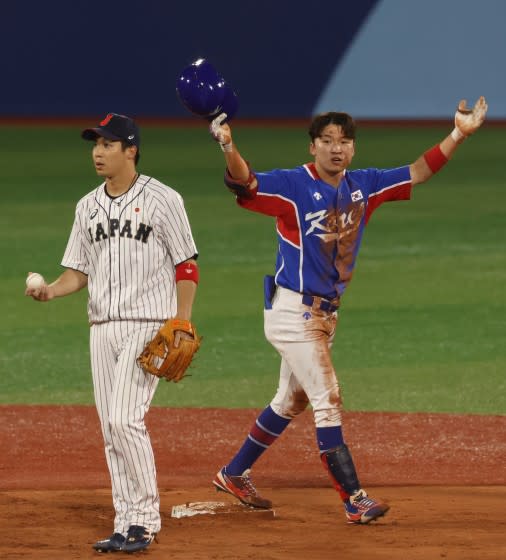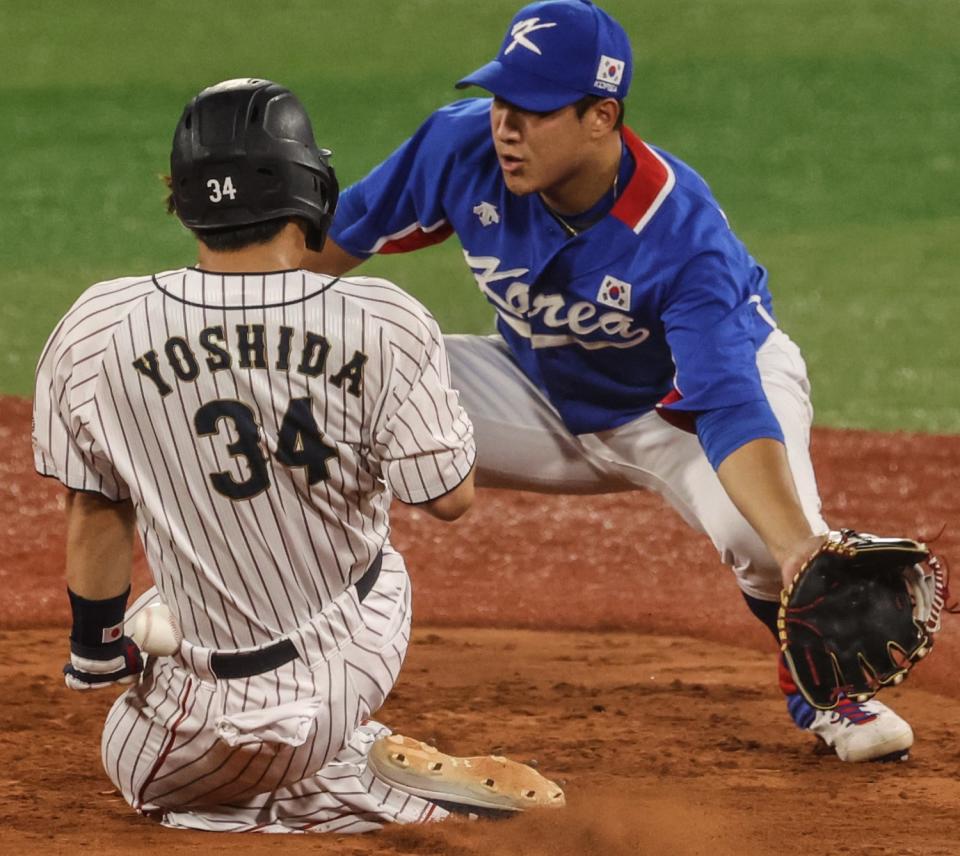When Japan and Korea met at the Olympics, baseball became the nationalist pastime
- Oops!Something went wrong.Please try again later.
- Oops!Something went wrong.Please try again later.

For about three hours Wednesday night, enthusiastic fans in Japan and South Korea tuned into a sporting event that for many represents something more than a just a part of competition during the Olympic Games. Times sports columnist Dylan Hernández, a Japanese Salvadoran American Angeleno, and foreign correspondent Victoria Kim, a Korean American Seoulite, watched a baseball game between two bitter rivals in Tokyo’s Koreatown to explore questions of identity and historical baggage and why this matchup was much more than a game.
Japan’s colonization of Korea in the early 20th century has left long scars that have manifested in active political controversies that continue to simmer today. The neighboring nations are deeply connected yet entangled in a web of emotions and historical resentment that heighten the stakes when they are on opposites sides, whatever the occasion.
Dylan: Living in Los Angeles prepared me for the worst.
I spent plenty of nights throughout my childhood at the Coliseum watching soccer games between teams from Mexico and El Salvador, the country of my father’s birth. There were always fights in the stands.
Once, I watched the pay-per-view telecast of a boxing match between Felix Trinidad and Fernando Vargas at a Glendale bar. After the Puerto Rican Trinidad stopped the Mexican American Vargas, someone was knifed in the parking lot.
So, as colleague Victoria Kim and I searched Tokyo’s Koreatown of Shin-Okubo for a place to watch the Olympic baseball game on Wednesday night, I braced myself for an uncomfortable experience. I didn’t anticipate any violence, not in Tokyo, a place so peaceful that some police officers are armed with wooden sticks instead of guns. But watching the game in the company of Koreans, I figured I’d sense how much they resented Japan, of which I am also a citizen.
High-stakes sporting events have a way of making ugliness spill out, and this was about as high-stakes as they came. This was Japan against Korea. In baseball. At the Olympics.
Victoria: I’m the furthest thing from a sports fan. I grew up within earshot of the main baseball stadium in Seoul, South Korea, and never went to a game as a kid. I spent four years in the Boston area for college and not once set foot in storied Fenway Park. I’m generally wary of overt displays of nationalistic fervor.
But a Korea-Japan match (and it’s always Korea-Japan, never Japan-Korea) in any sport always seems to carry a different sense of weight and importance that stirs an interest I didn’t even know was there.
In South Korea, any matchup against Japan is hyped as an opportunity for historic comeuppance for 36 years of colonial rule and 16th century wars of invasion. “Archenemies,” “Match of Destiny,” “Can’t-lose game” are stock phrases that dominate headlines in the lead-up to any game. “If you guys lose, swim back home,” is a go-to motivational insult that always makes the rounds on social media.

The East Sea, or Sea of Japan — the nomenclature being one of many sore points between the countries — is about 660 miles at its widest.
"Here come the opponents against whom we must win, even if in a game of rock, paper scissors," former Dodgers pitcher Chan Ho Park, a commentator for national broadcaster KBS, wrote on the eve of the game.
"It's the rival match in which all of our people are yearning for victory."
Dylan: There was controversy before the Games even started, with Korea’s Olympic delegation setting up its own kitchen because it feared the cuisine served in the athletes village included radioactive ingredients from Fukushima.
The media here picked up the story, leading to comments on social media about how the Koreans were ungrateful and should just go home.
When I think of Japanese-Korean relations, I often think of an incident at the most recent Winter Olympics in Korea. I’m afraid of heights and didn’t react well when I had to ride a ski lift for the first time in my life. I was sitting alongside a Japanese reporter whom I had never met.
“Don’t worry,” he told me. “I’m sure this ski lift was made in Japan or Germany, and not in Korea.”
Victoria: We strolled down Okubo-dori, Tokyo’s equivalent of Wilshire Boulevard in Koreatown, around dusk.
Despite the headlines and over-the-top TV spots, it wasn’t easy to find a place showing the game. At the half-empty basement seafood restaurant where we ended up, the manager told us the game would be on, but the TVs were tuned to the wrong channel and no one seemed to care.
But like fans at Dodger Stadium, the people filtered in after a couple innings and eventually filled the place where owner Jeon Koo-chil had put in set-top boxes earlier in the day specifically for this game.
Jeon had a financial stake on the game's outcome: he and a Japanese friend, who usually watch these games together, had bet 1,000 yen — about $9 — for each run scored by the other country, and loser would have to pony up another 5,000 yen to the winner.
“We can lose to other countries but not to Japan,” said Jeon, who in more than three decades of living in Japan, never misses a Korea-Japan game.
Dylan: We were seated in the back corner of the restaurant, next to three Korean men.
One of them started talking to Victoria, then turned his attention to me.

“Do you know Kid Yamamoto?” he asked in accented Japanese.
I told him I did.
“He was my pupil,” he said proudly, showing me pictures of him and Yamamoto on his iPhone.
That gave me an instant connection to this stern-looking Korean man. The late Yamamoto was a famous mixed martial artist. His brother-in-law is Yu Darvish, the former Dodgers pitcher, whom I've covered for years.
Our new friend said he was a former wrestler who represented Korea internationally. Kim Young-gu told me, “You look like Maradona.”
I think that was his polite way of saying I was fat.
Victoria: Dylan has been good-naturedly ribbing me — more accurately, trash talking — throughout the Olympics about the performance of South Korean athletes. All the while, I kept thinking back to a 1945 George Orwell essay on sports I first read in high school.
He calls sporting events "an unfailing cause of ill-will" over which nations "work themselves into furies over these absurd contests, and seriously believe ... that running, jumping and kicking a ball are tests of national virtue."
Especially at a time when the pandemic has shut down borders, heightened suspicions and generally torn the world apart, I’m not sure I’m sold on the premise that the Olympics “bring the world together.”
But as we sat down to a (literal) boatload of sashimi, or hwe, as we Koreans call it, I can’t help but feel a tinge of excitement at the possibility that the Korean team could beat the higher-firepower Japanese squad in their homeland, and at a sport they love so dearly.
And that’s coming from someone who had no idea until a South Korean journalist told me at Narita Airport upon arrival that baseball was a part of these Olympics.
I probably laughed a bit too hard in the third inning. Dylan ingested a sliver of spicy Korean pepper and struggled with the heat, breaking out in sweat and as much as he may deny it, had tears in his eyes. It may or may not have made up for the fact that Japan was up 1-0.
Dylan: Based on Victoria’s translations of stories and headlines on the game, it sounded as if the Koreans were treating the game like a matter of life or death.
The stories in Japanese publications projected no such alarm. One story mentioned Korea’s track record against Japan in international baseball, but that was about it.

Longtime baseball writer Junichi Ito later explained to me why.
If there was a game Japan could lose to Korea, it was this one. This was a double-elimination tournament, meaning the loser of the game would still be alive. Japan and Korea were considered the two best teams. Whatever the result, they would probably play each other again later in the week for the gold medal.
“How Japanese of you,” I told my friend, “using logic to suck the fun out of something.”
Victoria: At the top of the sixth, when South Korea scored two runs, tying the game, it’s like a jolt of electricity has gone through the restaurant and the disparate diners are abruptly cheering as one. The manager brings a round of free bottles of soju, Korea's most popular liquor, on the house to celebrate.
“When we win, it’s this release of something that was oppressed and condensed,” Kim Ok-hyun, a 57-year businessman at the table next to us, tells us.
One of Kim’s dining companions is wrestler and coach Kim Young-gu, gold medalist from the 1986 Asian Games. With the bases loaded in the bottom of the eighth and slugger Tetsuto Yamada at bat — “You’re screwed,” Dylan says with a smirk — the wrestler put his hands together and prayed out loud Yamada would strike out.
No dice. Yamada doubled to deep left center, scoring three runs. Final score: 5-2.
Dylan: Masakazu Hasegawa, 57, was sharing a table with his Korean wife and two Korean-born daughters.
“Here, we all cheer for our teams and that's it,” he said. “We don't fight.”
Hasegawa said the political controversies between the countries didn't bleed into how people feel about one another.
“The political world and popular culture are different,” he said. “The Koreans who are here are here because they like Japan, so nothing bad happens. So our attitude is, 'Let's mix our cultures. The people in the political world, go ahead and do whatever you want.'"
All around us, the atmosphere was festive. There wasn't any venom in the air. The Koreans I met this night treated the game as if it were, you know, a game.
This story originally appeared in Los Angeles Times.

